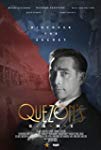Eye For Film >> Movies >> Quezon's Game (2018) Film Review
Quezon's Game
Reviewed by: Jennie Kermode

Between 1941 and 1945, around six million Jews were killed in Germany and its occupied territories. What sometimes escapes people today is that this didn't happen out of the blue. Antisemitism was rife for years beforehand and as politicians gradually bought into that rhetoric, a lot of Jews decided that the risk in remaining there was too high, that they needed to get out. The difficulty lay in finding another country that would accept them - Germany's prejudice was not unusual. Outside Europe and North America, though, they weren't seen in the same way. Some 1,200 found refuge in the Philippines. Had it not been for the subsequent Japanese invasion of the islands, they might have provided a refuge for many more.
Matthew E Rosen's film draws on US records from the time and correspondence left by two wealthy German industrialists who raised the plight of their Jewish countrymen with Philippines president Manuel L Quezon (played here by Raymond Bagatsing) to tell the story of this rescue and how it came about. It's heavily invested in presenting Quezon as a heroic figure, a man who wanted to help as soon as he understood the issues but faced challenges in selling that politically. The limitations of the sources and the obvious nationalistic sentiment suggest that a degree of caution is wise, but there's still an important message here about the power that politicians have to do real good in the world, if only they will use it.

A bigger problem for the film is that the story it tells never really comes alive the way it should. Despite the threat hanging over the refugees, there's little sense of urgency. This would seem to be due in part to the Rosen's desire to create a deliberately slow burning, quiet political drama, exploring the difficulties of turning beliefs into action within any system; and in part to its central figure's deliberate repression of emotion. Scenes with his wife (played by Rachel Alejandro) have more depth and energy because this is less necessary, and give us the chance to see how the threat to the Jews is registering with him on a personal level.
In the background there's dialogue around the country's emerging independence, in which Quezon played a crucial role, and its relationship with the US, which continues to take a paternalist role. This is likely to be new to audiences outside the Philippines and as such it makes a valuable contribution to the record, as does the film's observations about how the US itself turned away fleeing German Jews in the years leading up to the war, something you won't see mentioned n Hollywood's output on the period.
Bagatsing is impressive in the central role, subtle in his approach to showing us how Quezon gradually declined as a result of tuberculosis, effective in communicating the man's contrasting ideological certainty and fragile confidence. Although the script verges on hagiography, what he delivers is significantly more nuanced and likely to attract more, rather than less, audience sympathy.
Quezon's game is often too stagy and is lumbered with a repetitive soundtrack which distracts from what ought to be its more passionate moments, but it remains an important telling of a story that many people even within the Philippines have little awareness of, and one that seems particularly important to consider today.
Reviewed on: 20 Jan 2020


















